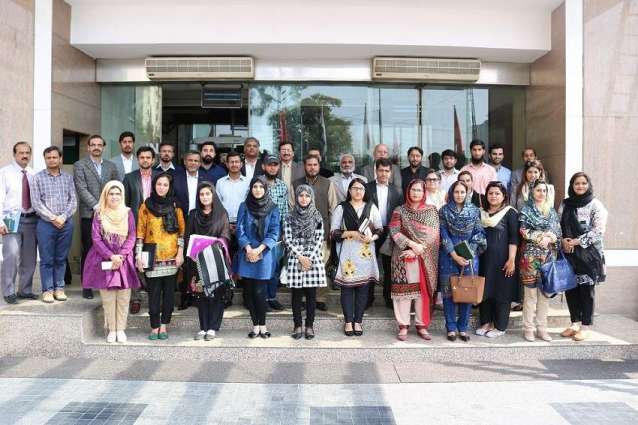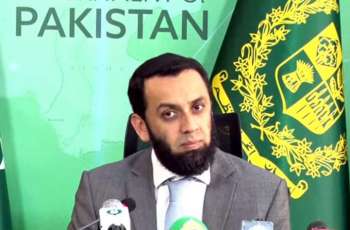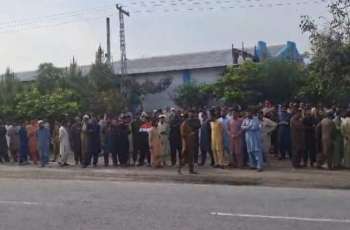WWF-Pakistan conducted a two-day capacity building session for stakeholders on compliance to national and international environmental laws, standards and obligations along with associated economic aspects
Lahore,(Pakistan Point News - 28th Feb, 2018 ) WWF-Pakistan conducted a two-day capacity building session for stakeholders on compliance to national and international environmental laws, standards and obligations along with associated economic aspects. This workshop was conducted under the project titled International Labour and Environmental Standards (ILES), Application in Pakistan’s Small and Medium Enterprises (SMEs) at a local hotel in Lahore.
On the first day, while presenting about Multi-lateral Environmental Agreements (MEAs) and effect of non-compliance of national environmental laws, Raffay Alam, Environmental Lawyer, said that the judiciary has played an important role in introducing environmental laws. He quoted the example of clean drinking water, which was declared a fundamental right. Junaid Ahmed, Environmental Economist, while presenting about the cost of pollution and valuation of non-compliance; informed participants about the cost associated of pollution through Disability-Adjusted Life Year (DALY).
Shafqat Abbas, Ministry of Climate Change, Government of Pakistan said, “The textile and leather sectors represent the largest domain of the industrial base and play a key role in the country’s economy and are also key contributors of carbon emissions in the country. There is a dire need for proper incorporation and implementation of Multilateral Environmental Agreements (MEAs), within local laws.” In addition, Dr Javed Iqbal, Director Projects, Environmental Protection Department (EPD) Punjab, speaking at the event as a Guest of Honour of the first day, said that Pakistan is a water-stressed country and is nearing the threshold of water scarcity.
Access to safe drinking water in rural and urban areas is declining and provision of potable water is a key issue that people face. He added that laws are already in place to tackle these issues but lack of acceptance from the public makes it more difficult for regulatory bodies to properly implement the environmental laws. On the second day, Arjmand Qayyum Amjad trained the participants about Smart Environmental Management Practices (SEMPs) in the textile value chain, through three module sessions.
He informed the audience about the main issues in the SMEs including, cleaner production practices, energy efficiency, and chemical management in the processes. He said that it is better to reduce the consumption of water at the start of the pipeline than to treat wastewater at the end of the pipeline, as it is also more expensive than water conservation. Speaking at the event as a Guest of Honour on the second day, Engr. Ghulam Zakir Hassan Sial, Director Irrigation Research Institute, Irrigation Department, Punjab said that safe drinking water is not available to the city of Lahore, and groundwater is depleting at a rate of 2.
5 feet/year. If this rate continues a time will come when there will be no safe water available for future generations of Lahore. Government departments including Pakistan Council of Scientific and Industrial Research (PCSIR), Environmental Protection Agency (EPA), University of Engineering and Technology (UET), National Engineering Services Pakistan (NESPAK), Punjab Saaf Pani Company (PSPC), Al Jazari academy, Water and Sanitation Agency (WASA), Ozkartallar Campak Joint Venture (OZPAK), Punjab Public Health Authority, Lahore Waste Management Company (LWMC), Pakistan Council of Research in Water Resources (PCRWR), The Urban Unit, Ministry of Climate Change, Industry Commerce and Investment Department, Infrastructure Development Authority Punjab, and many others participated in the two-day event.
The six-year ILES project, funded by the European Union, is jointly being implemented by WWF-Pakistan with the International Labour Organization (ILO) in Lahore, Karachi, Sialkot and Faisalabad. The project aims to implement international labour and environmental standards in Pakistan in order to improve the capacity of the public sector to implement Multi-lateral Environmental Agreements (MEAs) and national environmental laws and standards in Pakistan.
The project involves building capacity of the textile and leather sector to adopt Smart Environmental Management Practices (SEMPs) in order to efficiently use water and energy resources and reduce the use of hazardous chemicals by 15 to 20 per cent. Further, the project aims to contribute to improvement in industry based laws so that Pakistan’s export market can compete with international labour and environmental standards.




